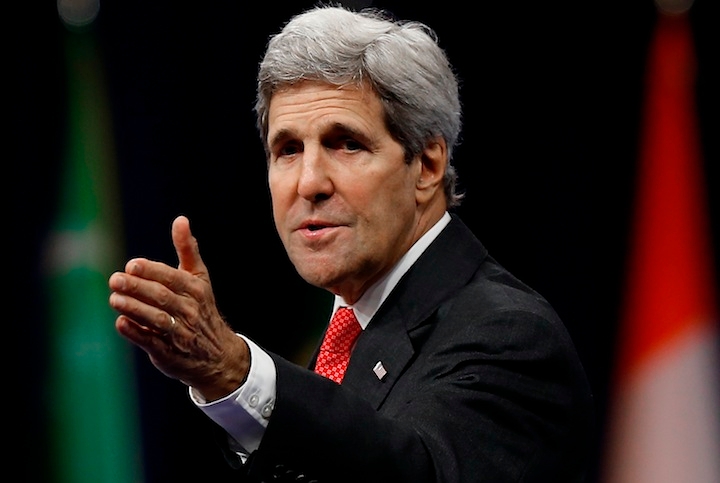Israeli concerns about Turkey and Qatar fuel dispute with Kerry
Published July 28, 2014

U.S. Secretary of State John Kerry delivering opening remarks at the Washington Fellowship for Young African Leaders Presidential Summit in Washington, July 28, 2014. (Win McNamee/Getty Images)
ADVERTISEMENT
WASHINGTON (JTA) — Behind the feud between John Kerry and Israel over the secretary of state’s efforts to broker a Gaza cease-fire is a larger tension concerning the role of Turkey and Qatar in Palestinian affairs.
Israeli officials rejected the proposal for a cease-fire advanced by Kerry in part because of what they see as the outsize influence on his diplomatic efforts of these two regional powers with agendas increasingly seen as inimical to Israeli interests. While both countries are traditional U.S. allies, they are also supportive of Hamas.
“Qatar, financially and politically, diplomatically and through Al Jazeera, is supporting a terrorist group,” an Israeli official told JTA. “Instead of contributing to the development of the area, they are contributing to terror in the region.”
Israeli officials point to the anti-Israel rhetoric of Turkey’s Islamist prime minister, Recep Tayyip Erdogan, which has reached new heights during the current conflict, with his suggestion that Israel is worse than the Nazis.
Israel prefers to have Egypt as the main interlocutor because the country’s current military-backed government has a deep antipathy toward the Islamist Hamas movement.
ADVERTISEMENT
Israel had previously embraced an Egyptian cease-fire proposal that was rejected by Hamas, which saw its terms as decidedly unfriendly.
Tamara Cofman Wittes, a deputy assistant secretary of state for the Middle East in Obama’s first term, said that Turkey and Qatar are necessary interlocutors because Hamas needs credible representatives of its interests in the negotiating process and because the two countries are not tempted to sabotage cease-fire efforts.
“I understand why Israel and Egypt are uncomfortable seeing regional actors friendly to Hamas involved in these talks. If they are not involved, they could spoil a cease-fire,” said Wittes, who is now the director of the Brookings Institution’s Center for Middle East Policy. “You have to get them engaged so they have reason not to act in an unconstructive manner.”
Tensions between Israel and the Obama administration over Kerry’s cease-fire efforts escalated over the weekend.
In comments to the Israeli press by unnamed Israeli officials, Kerry was depicted as a hapless bumbler who, however unwittingly, seemed to be negotiating on behalf of Hamas.
U.S. officials have told Israeli and U.S. media that they are offended by the Israeli backlash.
Abraham Foxman, the national director of the Anti-Defamation League, called on Israeli leaders to tone down the attacks on Kerry, saying such broadsides undermined Israel’s ability to face down its true enemy, Hamas.
“I understand there are disagreements between the United States and Israel, and maybe the secretary of state and Israel,” he said. “But those disagreements do not justify the ugly name calling. It undermines the relationship of the only true ally Israel has. In times of disagreement, one needs to embrace our friends.”
The exact nature of Kerry’s cease-fire proposal and how it came to be rejected by Israel’s Security Cabinet is not clear. But it is clear that the Security Cabinet’s eight ministers believed that it was tilted toward Hamas.
In a briefing for Israeli reporters, a senior American official is said to have argued that the document the Cabinet reviewed was simply one including the latest ideas for consideration and not a final draft.
Israeli officials, speaking anonymously to the Israeli media, have said they understood it as a final draft and that, in any case, even being asked to consider such a document was deeply unsettling.
Israelis say they were offended by the document’s detailed emphasis on what would be seen as wins for Hamas: Talks on opening borders and transfer of emergency funds to pay the salaries of employees in Gaza who had worked for the Hamas-led government and now are supposed to be incorporated into the Palestinian Authority under the recent Palestinian unity agreement.
Israel’s concerns, including the removal of rockets and missiles from Gaza and the destruction of a tunnel network that reaches inside Israel, were confined in the document to three words: “address security issues.”
There were also concerns, shared by Egypt, the Palestinian Authority and Western European countries, that the proposal would strengthen Hamas at the expense of the P.A.
On Sunday night, President Obama called for an “immediate, unconditional humanitarian ceasefire” in a phone call with Israeli Prime Minister Benjamin Netanyahu, according to a White House readout describing the phone call.
The readout nodded to Israeli concerns by reaffirming U.S. support for Egypt’s cease-fire efforts, while also stressing that Obama’s cease-fire call was building on Kerry’s efforts.
The readout also emphasized the importance of addressing Gaza’s economic plight, something that Hamas has made into a key precondition for a cease-fire.
“The President underscored the enduring importance of ensuring Israel’s security, protecting civilians, alleviating Gaza’s humanitarian crisis, and enacting a sustainable ceasefire that both allows Palestinians in Gaza to lead normal lives and addresses Gaza’s long-term development and economic needs, while strengthening the Palestinian Authority,” the readout said. “The President stressed the U.S. view that, ultimately, any lasting solution to the Israeli-Palestinian conflict must ensure the disarmament of terrorist groups and the demilitarization of Gaza.”
![]()














